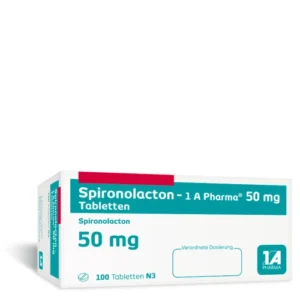Pharmacological action
Inhibitor of 5-alpha reductase – an enzyme that converts testosterone into more active dihydrotestosterone. Reduces the content of dihydrotestosterone in the blood and prostate tissue. Inhibits the stimulating effect of dihydrotestosterone on the development of prostate adenoma.
Finasteride helps to reduce the size of the enlarged gland, improves urine flow and reduces symptoms associated with benign prostatic hypertrophy. Several months of treatment may be required to reduce the clinical manifestations of the disease.
Pharmacokinetics
It is well absorbed and penetrates into the tissues and fluids of the body, is found in the ejaculate. Bioavailability is 80% and does not depend on food intake. Cmax is achieved in 1-2 hours. Plasma protein binding is 90%. It is excreted as metabolites by the kidneys (39%) and through the intestines (57%). T1/2 – 6-8 h. Long-term (3-7 months) use at a dose of 5 mg/day reduces the concentration of 5-alpha-dihydrotestosterone in the blood serum by 70%.
Indications for the active substance FINASTERIDE
Benign prostatic hyperplasia (to reduce the size of the prostate gland; improve urine flow and reduce symptoms associated with hyperplasia; reduce the risk of acute urinary retention requiring catheterization or surgery, including transurethral resection of the prostate and prostatectomy).
Side effects
From the reproductive system: rarely – impotence, decreased libido, decreased ejaculate volume, gynecomastia.
Allergic reactions: skin rash, angioedema are possible.
Contraindications for use
Hypersensitivity to finasteride, obstructive uropathy, prostate cancer. Finasteride is not used in women and children.
Use during pregnancy and breastfeeding
Women of childbearing age and pregnant women should avoid contact with the drug, as it has teratogenic properties (the ability to suppress the conversion of testosterone to dihydrotestosterone can cause developmental disorders of the genitals in a male fetus), penetrates into seminal fluid.
Use in liver dysfunction
Finasteride is prescribed with caution in liver failure.
Use in children
The drug is not used in children.
Special instructions
Finasteride is prescribed with caution in liver failure.
With a large volume of residual urine and/or a sharply reduced urine flow, it is necessary to keep in mind the development of obstructive uropathy.
Before starting treatment with finasteride and periodically during treatment, a rectal examination should be performed, as well as examination by other methods for the presence of prostate cancer.
Drug interactions
No clinically significant interactions of finasteride with propranolol, digoxin, glyburide, warfarin, theophylline and antipyrine have been detected.
Apparently, finasteride does not have a significant effect on the cytochrome P450 enzyme system and, accordingly, does not affect the pharmacokinetic parameters of drugs metabolized by liver microsomal enzymes.
No clinically significant drug interactions have been observed with the simultaneous use of finasteride with ACE inhibitors, alpha-blockers, beta-blockers, calcium channel blockers, nitrates, diuretics, histamine H2-receptor blockers, HMG-CoA reductase inhibitors, NSAIDs, quinolones and benzodiazepines.
Warning: always consult a doctor before using medications.












